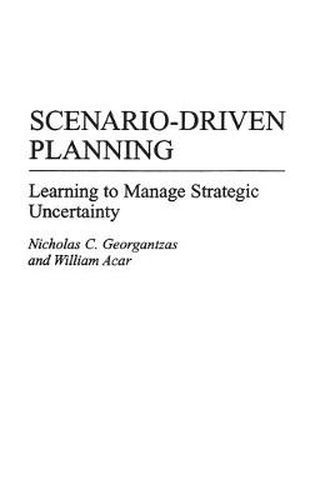Readings Newsletter
Become a Readings Member to make your shopping experience even easier.
Sign in or sign up for free!
You’re not far away from qualifying for FREE standard shipping within Australia
You’ve qualified for FREE standard shipping within Australia
The cart is loading…






Scenario-driven planning is a new management technology for strategy design that employs computed or strategic scenarios to improve the quality of managerial thinking. Strategic scenarios-the outcomes of modeling strategic situations-produce insight much richer than that expected from environmental scenarios alone. They bring to the consulting and upper-level management audiences a better way of handling strategic uncertainty, providing the tools managers and strategy students need for thinking and dialoguing about complex strategic issues.
This new Quorum book deals with a subject that has gradually emerged to the forefront of planning theory. Scenario-driven planning (SDP) is a new technology for management design that empowers organizations to address the various uncertainties that beset them. In recognition of the increasing turbulence of the business environment, this new technology for strategic management is attracting a great deal of attention. However, most present approaches to SDP fall short of the full power of modern management practices. Buttressed by an extensive index and reference list, this book is the most comprehensive treatment to date of the scenario approach. Written for practicing managers and consultants distrustful of quick fixes, as well as for academics and students in the field, the book starts with the present business malaise of developed economies and follows it with a presentation of the historical antecedents of the origins of SDP. It then gradually develops a modern treatment of the scenario approach, starting with its origins, proceeding with graduated case studies (simple applications first, followed by standard applications), and finally concluding with discussion of the theoretical issues and emerging trends that underlie the scenario approach.
Drawing on their combined theoretical and consulting experiences, the authors enumerate the cognitive biases and other obstacles to the management of strategic uncertainty. They present a method that goes beyond the enumeration of judgemental environmental scenarios, and introduce simple as well as more sophisicated methods for computing strategic decision scenarios. Called CSM (Comprehensive Situation Mapping), this analytical approach to strategic planning allows managerial thinking to soar past the bureaucratic side of planning in order to take advantage of creative dialectics. Because of its computational and dialectic features, the CSM approach can be used by astute corporate leaders as an opportunity for promoting organizational learning.
$9.00 standard shipping within Australia
FREE standard shipping within Australia for orders over $100.00
Express & International shipping calculated at checkout
Scenario-driven planning is a new management technology for strategy design that employs computed or strategic scenarios to improve the quality of managerial thinking. Strategic scenarios-the outcomes of modeling strategic situations-produce insight much richer than that expected from environmental scenarios alone. They bring to the consulting and upper-level management audiences a better way of handling strategic uncertainty, providing the tools managers and strategy students need for thinking and dialoguing about complex strategic issues.
This new Quorum book deals with a subject that has gradually emerged to the forefront of planning theory. Scenario-driven planning (SDP) is a new technology for management design that empowers organizations to address the various uncertainties that beset them. In recognition of the increasing turbulence of the business environment, this new technology for strategic management is attracting a great deal of attention. However, most present approaches to SDP fall short of the full power of modern management practices. Buttressed by an extensive index and reference list, this book is the most comprehensive treatment to date of the scenario approach. Written for practicing managers and consultants distrustful of quick fixes, as well as for academics and students in the field, the book starts with the present business malaise of developed economies and follows it with a presentation of the historical antecedents of the origins of SDP. It then gradually develops a modern treatment of the scenario approach, starting with its origins, proceeding with graduated case studies (simple applications first, followed by standard applications), and finally concluding with discussion of the theoretical issues and emerging trends that underlie the scenario approach.
Drawing on their combined theoretical and consulting experiences, the authors enumerate the cognitive biases and other obstacles to the management of strategic uncertainty. They present a method that goes beyond the enumeration of judgemental environmental scenarios, and introduce simple as well as more sophisicated methods for computing strategic decision scenarios. Called CSM (Comprehensive Situation Mapping), this analytical approach to strategic planning allows managerial thinking to soar past the bureaucratic side of planning in order to take advantage of creative dialectics. Because of its computational and dialectic features, the CSM approach can be used by astute corporate leaders as an opportunity for promoting organizational learning.